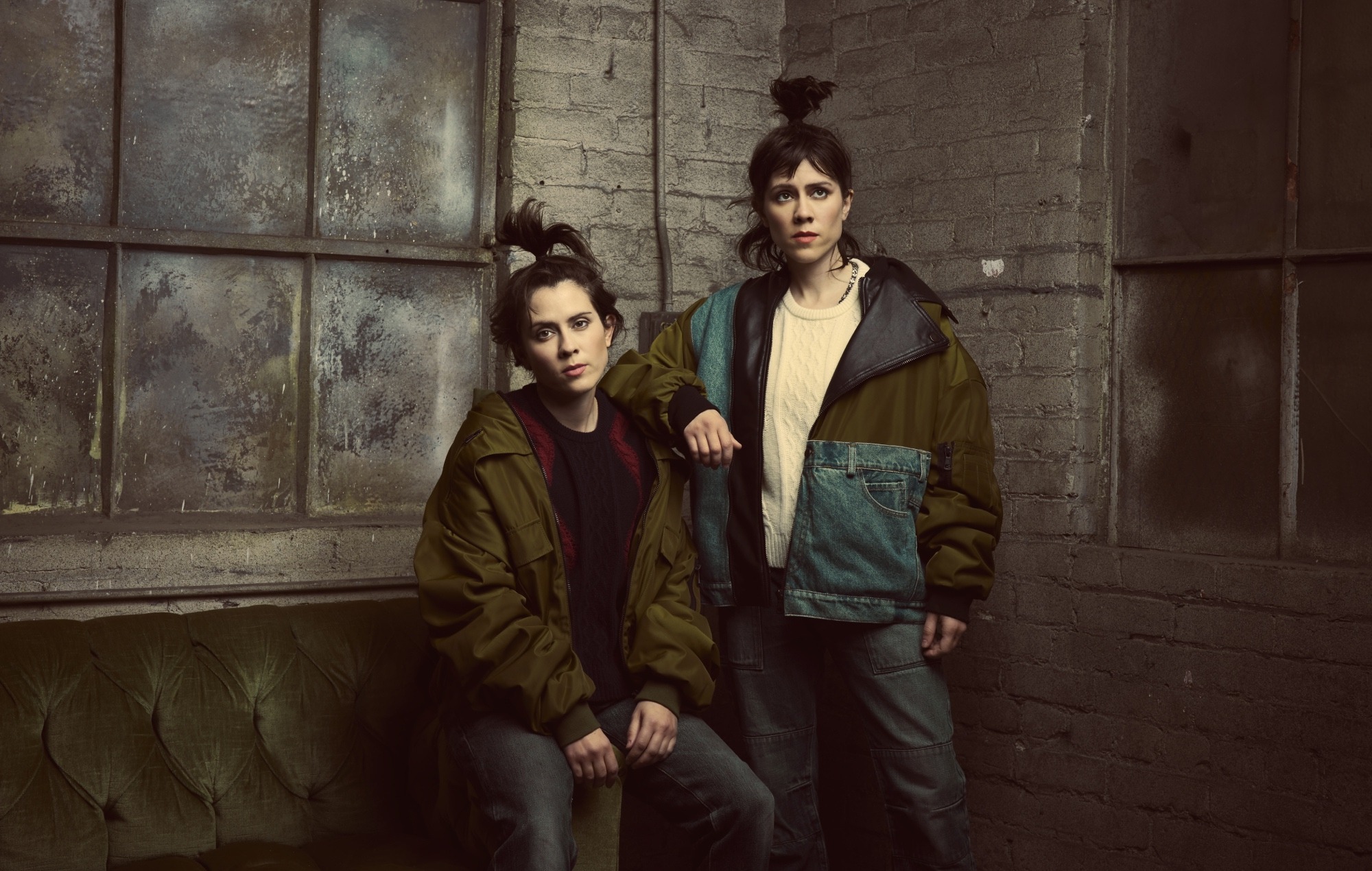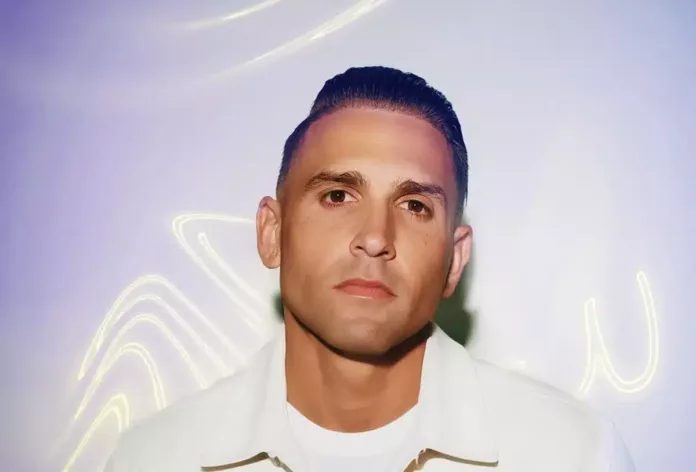
Tegan and Sara: “How have we lasted 25 years? Strategy”
As Tegan and Sara ready their latest album ‘Crybaby’, due in October, it feels like an apt time to ask about longevity. After all, nearly every band starts out wanting to last the distance, but many stumble when their fanbase shrinks or they encounter “creative differences”.
The Canadian duo stood out when they self-released their debut LP ‘Under Feet Like Ours’ in 1999: not just because they were identical twin sisters, but also because they were out and proud queer women navigating the male-dominated world of indie rock. “I said, ‘Yes this is my life, and yes you should care’,” Tegan sang on ‘Clever Meals’, an assertive and self-aware highlight from that album.
They still stand out now, something Tegan acknowledges by saying matter-of-factly: “We’re not like every other band.” She’s the second Quin sister NME speaks to in a kind of Zoom relay: before the chat, we’re told the duo “prefer to interview separately”, a policy that seems sensible given that video calls can be awkward enough. It also turns out to be generous when each Quin talks for longer than her allotted time while maintaining a level of engagement many would struggle to muster at 9am, the local time in Vancouver where both sisters have homes with their respective wives.
Anyway, back to what sets Tegan and Sara apart and keeps them vital. “Aesthetically and sonically, we’ve been allowed to move around because we moved from the beginning, so we’ve always been a bit of a nomadic band in that sense,” says Tegan. She attributes the group’s “freedom to take risks” to the fact their fans connect to both her and Sara as songwriters rather than belonging to any particular genre of music. In the past, the duo have pivoted from emo-leaning indie to brightly-coloured pop. “I also think more bands could do that, but they’re afraid and that’s totally fair,” Tegan says. “But I think that that’s why bands break up: they get bored because they’re doing the same shit.”
No one could accuse Tegan and Sara of falling into that trap with their new album ‘Crybaby’. Co-produced by the duo with St. Vincent collaborator John Congleton, it’s a quirky and incredibly hooky alt-pop record that could be the duo’s most sonically surprising effort yet. ‘Crybaby’ sprung up from a couple of “glitchy, lo-fi” demos that Sara made at home during the pandemic using the sampling app Keezy. Those demos evolved into the album’s opening twofer: the scuzzy power-pop blast of ‘I Can’t Grow Up’ and the more reflective mid-tempo ‘All I Want’, both of which feature off-kilter vocal loops. A few songs later, the pitch-shifted vocals of ‘I’m Okay’ take Tegan and Sara somewhere close to hyperpop territory.
The Quin sisters have always written their songs individually before then sharing their wares with one another for feedback: after all, it wasn’t until their sixth album, 2009’s ‘Sainthood’, that they began sharing co-writing credits. Interestingly, ‘Crybaby’ sounds as though it could be their most purely collaborative effort yet. In a band-approved biography that accompanies the album, Tegan says that “Sara effectively improves everything of mine that she works on”, prompting Sara to describe herself “with a laugh” as the “renovator” of the band.
Today, one sister is much less comfortable digging into the creative process. “This is gonna sound a bit dramatic,” Sara says with a self-deprecating eye-roll, “but I find it so exhausting to try to come up with a new way to tell people we made an album.” We both laugh. “How do I articulate it?” Sara continues, becoming a touch more serious. “It was a different way to work and we definitely switched things up, but it’s still this abstract process that’s always been difficult to talk about.”
Later, in her segment of the interview, Tegan offers a fascinating insight into how this abstract process can sometimes play out. When NME asks if she and Sara have learned not to push each other’s buttons after making 10 albums together, she shoots down the idea with a hoot. “No, no, no… I feel like the longer we do this, the more we know how to [push each other’s buttons], and then we do it more,” she says. “And when I say ‘we’, I mean Sara! From my perspective, I receive a lot of feedback and I make a lot of compromises.”
Tegan says their latest single ‘Yellow’, a tender ballad with a video that pays homage to the Coldplay song of the same name, is very much a case in point. “When Sara sent me that song, I was like: ‘It’s so beautiful, it’s so slow and sad,’” she recalls. “And then I thought: ‘My God, this is so hooky – like, speed it the fuck up, this is a fucking pop song.’ And Sara was like: ‘No, this is the way it is.’” ‘Yellow’ did end up with a slighty faster tempo, but only because Congleton suggested it. “Sara will let other people tinker with her shit,” Tegan says, “but I feel like she is very resistant to me.”
Frankly, this sounds as though it must be pretty frustrating in the moment, but Tegan clearly regards it as an integral and positive part of the band dynamic. “I think that resistance and stubbornness in the both of us allows us to be quite solid,” she says. “Like, if someone walked up to me now and said they didn’t like the sound of our new record, I’d tell them they’re wrong. I’d be like: ‘This is absolutely the direction we were meant to go in.’ I think with Sara and me, that butting of heads is what allows us to be so sure [of our music] once it comes out.”

Tegan believes this solidarity stood them in good stead when they changed lanes a decade ago. After making their name with six albums of melodic and emotionally literate indie rock – including three that earned gold discs in Canada – the duo aimed straight at the mainstream with 2013’s brilliant ‘Heartthrob’ LP. Out went indie grit, and in came pop gloss courtesy of future Adele producer Greg Kurstin. Lead single ‘Closer’ was such an undeniable bop that it even got covered on Glee, a hefty endorsement at the time.
“When people said, ‘We don’t know about ‘Heartthrob’,’ we were like: ‘You’re fucking wrong, of course we can make pop music,’” Tegan recalls. “And we were right. And I think that’s because we had to punch each other out, like, a thousand times to get to that point. We’re like Fight Club.”
Having one another’s back must have also helped when they encountered a steady stream of sexism and homophobia at the start of their career. Rather generously, Sara chalks some of this down to the less enlightened cultural climate of 20 years ago. “Like, we were 18 or 19 and we were having conversations with men, always men in their thirties and forties, about our relationships and sexuality and identity,” she recalls. “When I look back on it now, it’s very odd. These were not the people, I think, to navigate conversations and topics that were complicated back then. We didn’t have the right language – we didn’t, and certainly the journalists we were talking to didn’t.”
Though Sara accepts that some of the homophobia and misogyny that seeped into their press coverage “may have been unintentional”, she’s not prepared to let every toxic bro off the hook. “It was a nightmare,” she says plainly. “The culture back then was so mean, and it was cool to be mean.” For a time, writing about Tegan and Sara in a mean way seemed like the “popular” opinion to hold. “I don’t think it’s an exaggeration to say that those things that people said and that climate [generally] was devastating,” she says. “It wasn’t a joke to us and it was really profound. And I’m so fucking glad it’s changed.”
In fact, it became so devastating that Tegan and Sara decided they “had to start fighting back”. They asked their publicist to query any particularly cruel coverage, even if this meant that the publication in question might blacklist them. Sometimes, Sara even took matters into her own hands. “I remember writing to the guys who ran Stereogum because their comments section was a nightmare,” she recalls. “Like, it wasn’t even [comments] about our band. I was like: ‘Do you know it’s full of fatphobic, transphobic, anti-gay [abuse]? Why are you not censoring this stuff?’”
Sara says it was “exhausting” relaying the same basic message for years on end: “You can hate our band and our music, but you shouldn’t use this messaging because it’s based on misogyny or homophobia.” But now she takes pride in helping to create a kinder climate for artists, especially those from marginalised groups. “I don’t care if anyone ever sees us as being part of how that change was ushered in, because I know that we were,” she says.
“I care about the fact that through finding us, people were able to live their lives differently” – Sara Quin
By speaking about being queer right from the start of their career, Tegan and Sara also helped usher in a climate where it’s become easier for LGBTQ+ musicians to be out and proud. British singer-songwriter Shura told Dazed in 2017: “As a young queer kid who played a guitar, it was inspiring to see two openly queer women making incredible music.” But, perhaps surprisingly, Sara says she’s less concerned with this aspect of their legacy than the safe space they created for their fans. “I care about the fact that through finding us, people were able to live their lives differently,” she says.
The group’s secret weapon – or maybe their Trojan horse – was selling “a fuck ton” of Tegan and Sara T-shirts. “We would put our faces on everything and that was not cool in the indie world,” Sara recalls. “It also wasn’t as cool to be gay then, and sometimes [the reaction] was even hostile in places we were playing – like Louisiana, or Texas, or Manitoba in Canada. But fans would buy T-shirts [showing] us as out gay people, and wear them proudly. That was important because there wasn’t queerness represented everywhere [at the time].”
At this point, Sara allows herself a pat on the back – one she and her sister definitely deserve. “I think our confidence and refusal to feel insecure about ourselves for being gay, or for having gay fans, I do think that was ahead of its time,” she says. She believes High School, the upcoming TV series based on their memoir of the same name, will also move the dial forward. “With storytelling around queer relationships, whether [the characters are] adults or kids, it’s like we’re only allowed to like one person,” she says. “But my recollection of high school was that the possibility of connection and sex with girls was everywhere: the same as it would have been if I was straight. And you’ll see that in the show.”
Adding “TV producers” to their CV is surely another of what Tegan calls “our big swings”. Still, it would be a mistake to think that these are ever taken on a whim. “How have we lasted 25 years? Strategy,” Tegan says. “Like, our second album was called ‘The Business Of Art’ because we understood even when we were 21 years old that this is a business.” She credits having no manager for the first three years of their career with teaching them to be “very cognizant and present” in every decision.
“We never blame anybody for anything,” she says. “I mean, it’s Tegan and Sara – there’s nobody else in the band. Who else are we going to blame, the drummer?”
Tegan and Sara’s new album ‘Crybaby’ will be released on October 21 via Mom+Pop Music



